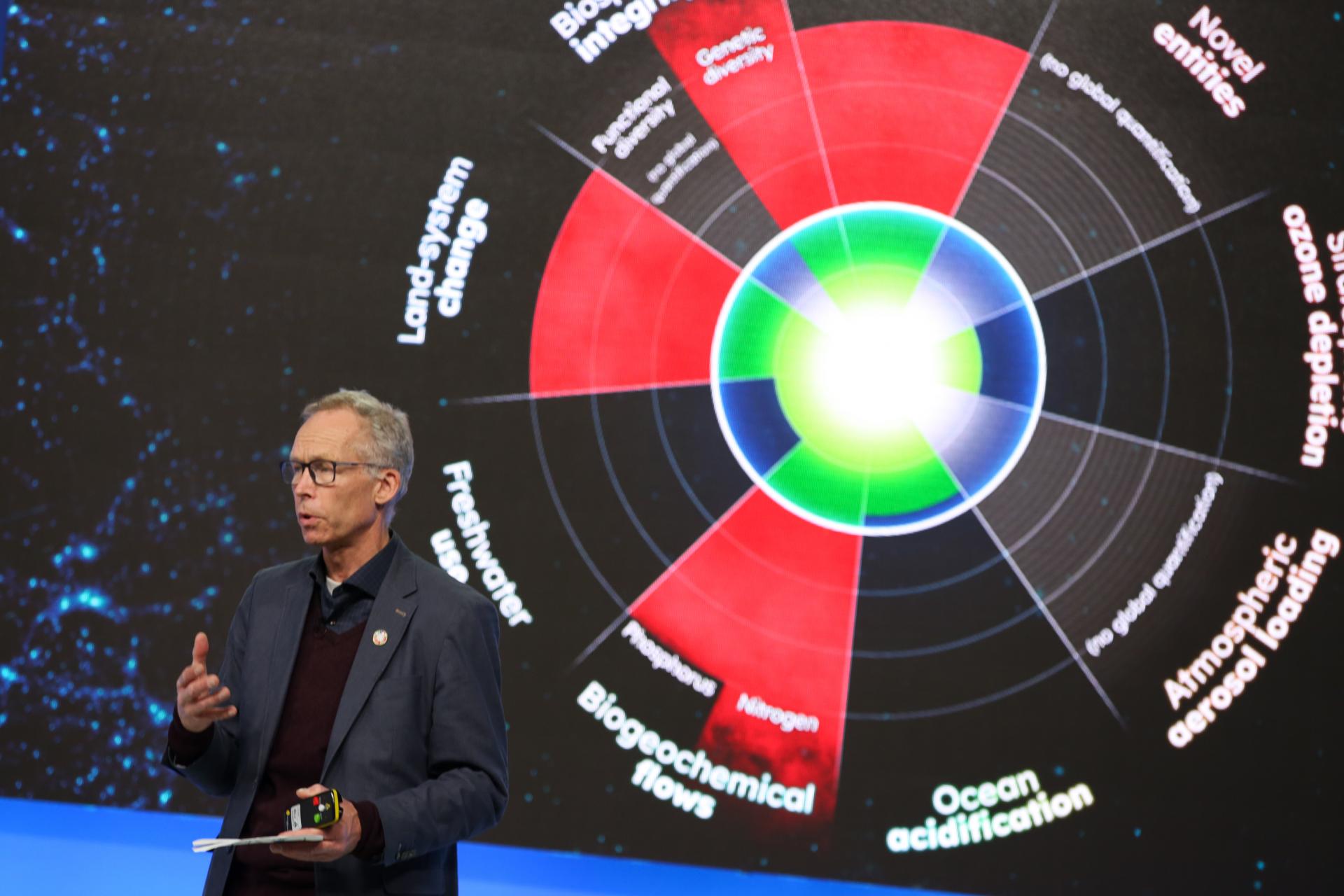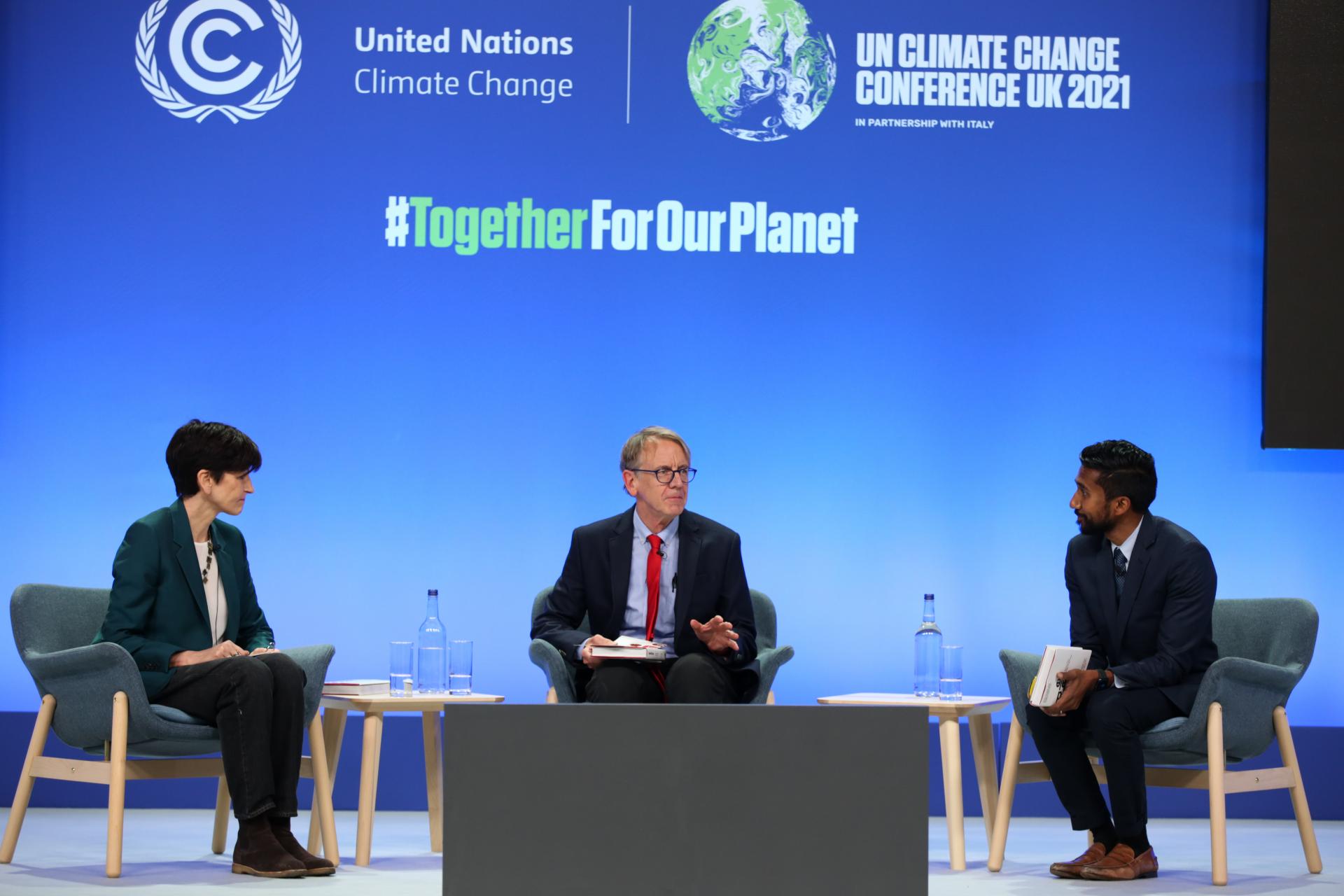Countdown at COP26 represents a collaborative effort between TED and Future Stewards, aiming to highlight potential remedies for the climate crisis. Over the course of three evenings hosted at the Climate Action Hub, an array of speakers delved into the obstacles and, more importantly, the solutions that are within reach for all of us to pursue. All three sessions underscored the significant level of innovation, determination, and aspiration prevalent in the global community—attributes vital for advancing towards a world with net zero emissions.
The first night focused on energy and featured one of the world’s most renowned climate scientists; a legendary investor who has co-written a compelling book about climate action; a climate activist and author; and a renowned environmentalist.
Streamed live on Nov 4, 2021, the opening session of Countdown@COP26 features: Johan Rockström (Earth systems scientist, on the state of climate), Ilissa Ocko (Atmospheric scientist, on cutting methane emissions), Solomon Goldstein-Rose (Climate author, on cleaning the electricity grid), Jamie Beard (Environmentalist, on geothermal energy), Chibeze Ezekiel (Activist, on stopping the construction of Ghana’s first coal plant), and John Doerr and Ryan Panchadsaram (Authors of “Speed & Scale: An Action Plan for Solving our Climate Crisis Now”).
Johan Rockström, Earth systems scientist, on the state of climate
There are three key messages: the IPCC assessment is a ‘code red’ – we have never had so many assessments confirming we are deep in crisis. This is the alarm bell and it has gone off so many times. We have had six IPCC assessments, which is like 30 years of us pressing the snooze button and failing to act. The sixth assessment is the Sleeping Beauty of assessments: we have to wake up now and act.
One insight from science is that 1.5 degrees is still possible, the window is still open from an earth science perspective, but is it still feasible from a political perspective?
We are quite uniquely placed, as for the first time in COP history we are talking about the pace of change and not fighting about whether we have a problem or not. We still have an uphill journey, but we are at least seeing integrated policies. We are starting to see a momentum that’s not enough but it is at least beyond incremental.

John Doerr, venture capitalist, co-author of Speed & Scale: An Action Plan for Solving our Climate Crisis Now
The plan is total societal transformation. There are six big goals: electrify transportation; decarbonise the grid with wind and solar; fix our food systems and reduce our beef and dairy consumption and reduce food waste; protect nature and stop deforestation; clean up our industrial practices, in particular the way we make steel. The sixth goal is the hardest technical problem of all: direct air capture, and use natural means to remove the carbon we can’t remove with technology. And we need to do all of these six things all at once.
My message to business world is that the transition to the clean energy economy is underhyped – it is the greatest economic opportunity of our lifetime and if we fail, the cost will be huge. For example, there are 1 in 5 premature deaths due to pollution. If we achieve our objectives we can unlock tremendous health and economic prosperity as we transition to the clean energy economy. We see signs of how costly that will be – we saw €30 billion worth of flood damage in Europe in the past year alone. How much more suffering do we have to ensure before we understand it is cheaper to save the planet than to ruin it?
Climate change amplifies inequities. Those who have done the least suffer the most. The US must decarbonise first to show world it can be done and to drive down the cost. US, EU and China will have to fund the energy transition to cleaner energy. We should look at climate crisis as the humankinds greatest opportunity to tackle global inequity.

Ryan Panchadsaram, engineer, investor and co-author of Speed & Scale: An Action Plan for Solving our Climate Crisis Now
We have to get to zero faster, we have to pull on a set of accelerants and we have to win the policy arguments and the politics. Commitments need to turn into action in our home countries, while shareholders rise up in the boardroom, voters voting, while we drive down the cost of technologies and invest in R&D to venture capital.
We have 80 per cent of the solutions that we need. Solar and wind are at record low prices. Lithium ion prices dropping too. We need to scale up the things we need now. We need to invent more. We need to invent better batteries or better nuclear technology. Regards air travel we need to invest in carbon neutral fuels and SAF but they are still too expensive right now. We will need a lot of innovation to cut the second half of those carbon emissions, that we need to.
Solomon Goldstein-Rose; Climate author, on cleaning the electricity grid
The world generates 25 trillion hours of electricity every year, which is why we need to replace fossil fuel plants with clean energy. One third is already clean and clean generation is growing. We are on track to 25 pedawatt hours by 2050.
We don’t need to change the electricity systems, we need to build an entirely new one, one that is fives time bigger than the current one. This mindset needs to go beyond electricity generation. Addressing climate change means building a new world, one in which energy is healthier and cheaper and everyone has access to it, a world with longer lives; ultimately a better world.
Jamie C. Beard; Environmentalist, on geothermal energy
The core of the Earth is the same temperature as the sun, and it is the Earth’s crust that keeps this incredible heat source invisible. We don’t have to drill far to reach temperatures that we would need to power the world for all of civilisation. So, how do we make this happen?
There are teams of innovators right now working on figuring out on to tap this enormous heat source below us. I am not talking about geothermal somewhere in Iceland, I am talking about making geothermal energy accessible everywhere in the world. We have new technology like directional drilling which enables us to reach precise locations miles underground. We are now in the middle of a geothermal renaissance, with more start-ups setting up in the past 18 months than in past ten years combined.


